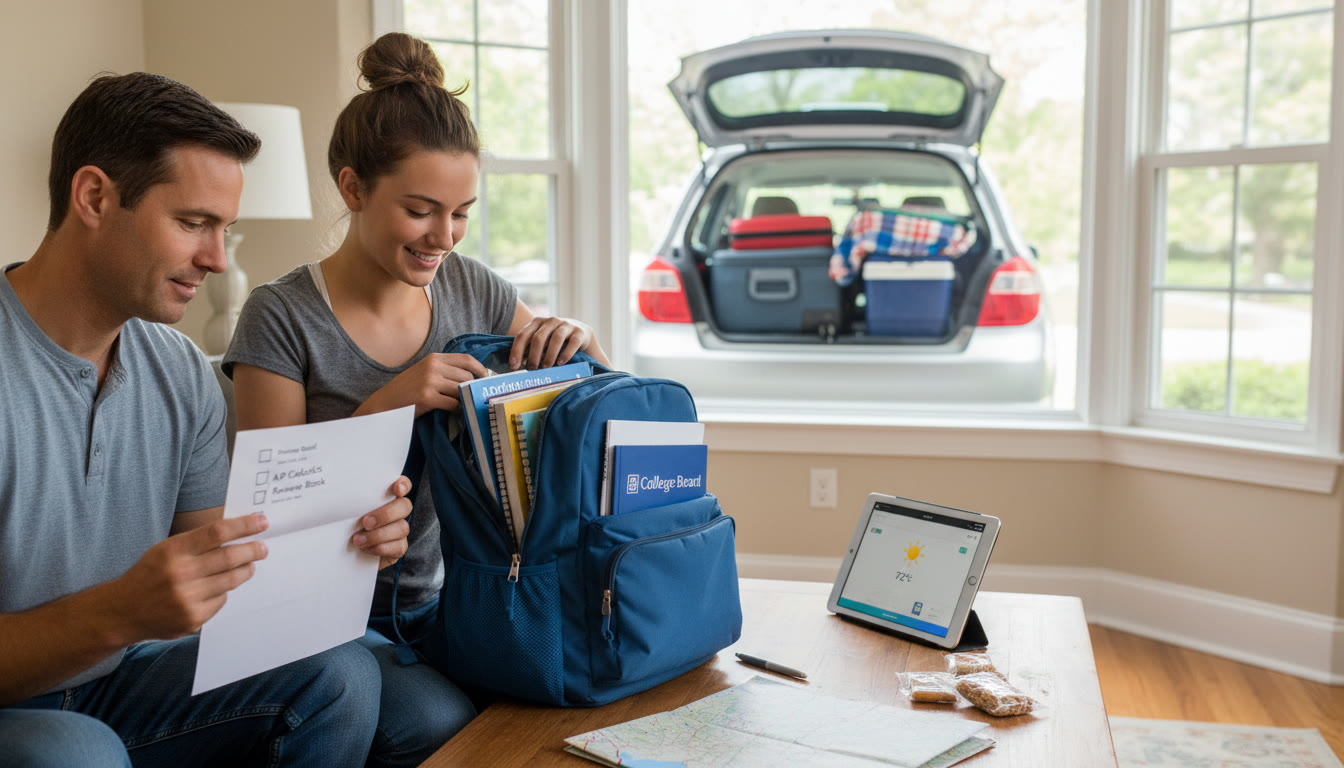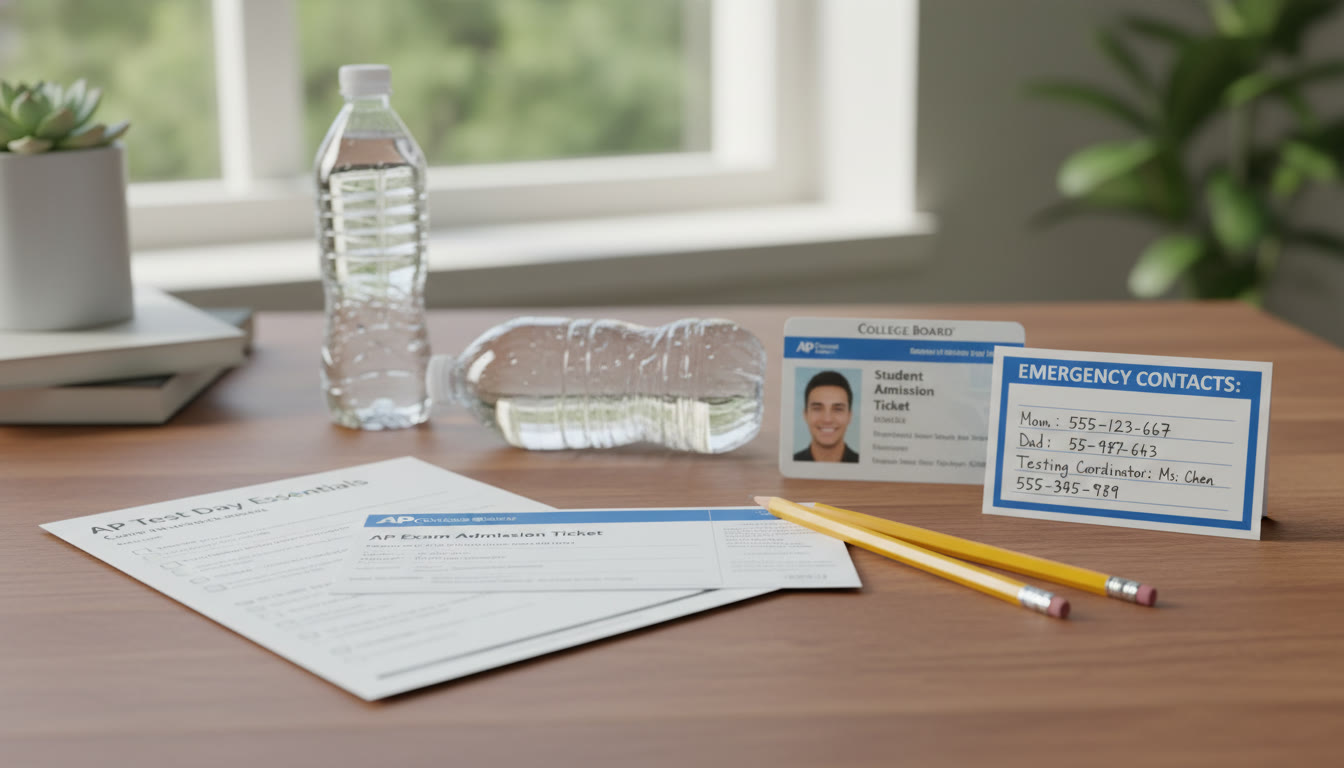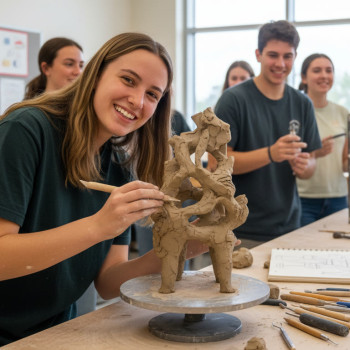When the forecast says ‘chance of chaos’: why parents should think about insurance for AP test-day travel
It’s the week before AP exams. You’ve seen the schedule, you’ve bookmarked the testing location, and your child has been doing a disciplined mix of practice tests and review. Then you open your phone: a weather app with a red banner. Or there’s a crash on the highway the morning of the exam. Or public transit announces delays. Suddenly, a day that felt mapped and manageable looks fragile.
This post is a friendly, practical guide for parents who want to protect the hours and months of preparation that lead up to an AP exam. We’ll talk about what travel and weather insurance actually do (and don’t do), how to decide when it’s worth buying, what school and College Board policies you should know, smart contingency plans to reduce stress, and how targeted support—like Sparkl’s personalized tutoring—can reduce the stakes by keeping your student confident even when the unexpected happens.
Why think about insurance for a test day?
Insurance isn’t just for flights and fancy vacations. On test day, the factors that can derail an exam are surprisingly mundane: a storm that shuts down roads, a family emergency that requires sudden travel, or an accident that delays a student’s arrival. When an AP exam is a gateway to college credit or a stronger transcript, the stakes convince many parents to plan for contingencies.
But insurance isn’t a cure-all. There are trade-offs—cost versus the likelihood of a claim, the fine print on coverage, and how exam providers handle missed tests. Understanding these trade-offs is the first step to making a level-headed decision.
Types of insurance and protections to consider
Not every insurance product is relevant for AP test-day risks. Here are the most useful types to know:
- Trip or travel delay insurance: Often aimed at travelers, this coverage can reimburse nonrefundable transportation costs or provide funds for unexpected overnight stays when travel is delayed by weather or accidents. For families who need to travel out of town for an AP exam, this can offer protection.
- Event cancellation or postponement coverage: This covers pre-paid, nonrefundable costs associated with a specific event. If you’ve paid for a hotel or private testing center (less common for AP exams but possible for accommodations), this may be relevant.
- Roadside and vehicle insurance add-ons: If your plan involves driving a significant distance on test day, strong auto insurance and roadside assistance can reduce the chance that a mechanical problem becomes a missed exam.
- Medical emergency travel coverage: If a sudden illness prevents attendance, some travel insurance policies reimburse certain costs or provide assistance services—useful if the family is out of town.
What insurance usually won’t cover for AP exams
It’s important to know the limits. Most commercial travel insurance policies do not cover:
- No-shows for reasons not listed in the policy (e.g., severe test anxiety that prevents attendance).
- Changes in testing policies from the exam provider (these are governed by the College Board’s procedures).
- Failure to plan or allow enough travel time (if you leave late and miss the exam due to your own scheduling choices, a claim is unlikely to be approved).
How College Board policies and school protocols matter
Before buying any insurance, check institutional rules. The College Board and local school/district test coordinators have specific policies about missed AP exams, makeups, and documentation. Here are practical steps:
- Contact your child’s AP coordinator or the school’s testing administrator well before the exam to confirm start times, recommended arrival windows, and emergency protocols.
- Ask about official make-up exams and the legitimate reasons accepted for rescheduling (medical emergencies and documented incidents often qualify).
- Get clarity on what documentation might be required—police reports, medical certificates, or proof of transit disruptions—so if something happens you aren’t scrambling to assemble paperwork.
Insurance claims will typically require supporting evidence. If the College Board or school requires a specific type of documentation to allow a makeup, make sure your insurance policy aligns with that reality.
Practical checklist: What to verify before the exam season
- Confirm the exact exam date, start time, and location on College Board’s official materials and with your school.
- Ask about alternative testing dates and their eligibility rules.
- Check your vehicle insurance, roadside assistance coverage, and whether your homeowner’s or travel policy includes coverage for trip interruption.
- If flying or staying overnight, read the travel insurance policy for definitions of “covered reasons” and claim documentation.
- Note phone numbers for the school testing coordinator, local emergency services, and transportation providers.

Decision framework: when does insurance make sense?
Deciding whether to buy insurance depends on three core questions:
- How important is the exam outcome? If the AP score could unlock significant college credit or scholarship opportunities, the potential cost of missing it may justify insurance.
- How likely are travel disruptions? If the test location is far, or the route crosses weather-prone areas, the risk is higher.
- What are the financial stakes? Consider nonrefundable travel costs (hotels, flights, train tickets) and lost time. If these sums are significant, insurance becomes more attractive.
Example scenarios:
- Short local drive to the school: insurance is probably unnecessary; invest time in creating a local contingency plan instead.
- Out-of-town exam with flights booked: travel insurance covering trip delay and cancellation could be worth the premium.
- Student relying on public transit with known strikes or severe weather in the forecast: check transit policies and consider alternatives; sometimes prepaid ride services plus flexible hotel options are a more practical hedge than a formal insurance policy.
How to read the fine print (the three clauses to prioritize)
When you compare policies, focus on:
- Covered reasons: Does the policy explicitly list weather, accidents, or public-transport disruptions as covered reasons for delay or cancellation?
- Proof requirements: Will the insurer accept local news reports, police reports, or official transit advisories as proof? Know what documentation you’d need if you ever file a claim.
- Time windows and exclusions: Many policies mandate reporting delays within a narrow time window. Others exclude certain preexisting conditions or states of higher risk.
Concrete preparedness: practical alternatives and complements to insurance
Insurance is one tool; preparation is another. The best strategy is layered: reduce the chance of needing insurance, then only rely on insurance for high-impact exposures.
Layer 1 — Local contingency planning
- Leave extra travel time—arrive well before the school’s recommended arrival window.
- Plan multiple routes and rehearse them on a calm day so you’re not choosing for the first time under stress.
- Identify backup drivers or ride options (family members, neighbors, paid rides) and discuss a rapid call tree.
Layer 2 — Communication and documentation
- Make sure phone numbers for the testing coordinator and school are saved under easy-to-find names.
- If an incident occurs, document it immediately: photos, timestamps, and notes will help both with school make-up requests and any insurance claims.
Layer 3 — Academic redundancy
Even the best logistical planning can’t prevent every emergency. Academic redundancy means giving your student test-day confidence so a delayed exam (or even an emergency replacement plan) won’t produce panic. This is where targeted support, like Sparkl’s personalized tutoring, can be helpful: 1-on-1 guidance, tailored study plans, and AI-driven insights help students build consistent performance so a makeup test or a rescheduled date becomes manageable rather than devastating.
What to do on the morning of the exam if things go wrong
Keep this short list on your fridge or phone. When adrenaline is high, a small playbook prevents chaotic decisions.
- Call the school’s testing coordinator immediately and explain the situation. Many schools appreciate a quick heads-up.
- Gather immediate proof (photos of road conditions, transit alerts, or traffic reports) and note times.
- If you’re buying a last-minute travel alternative (like a taxi or rideshare), keep receipts—some travel insurance policies reimburse such costs when travel is delayed for a covered reason.
- Document phone calls: time, contact name, and what was said. This helps with both school and insurance follow-up.
Sample emergency script for calling the testing coordinator
“Hello, this is [Parent Name], the parent of [Student Name], who is registered for the AP [Subject] exam that begins at [time]. We are currently delayed because [brief factual reason—e.g., multi-car accident on Route X]. We’re on our way and expect to arrive at [estimated time]. I wanted to notify you and ask about your protocol if we arrive late or cannot make it. I’ll also be sending photos and any official documentation immediately. Thank you.”
Comparing costs: when a policy’s premium makes sense
Here’s a small table to help parents weigh whether to pay a policy premium. These are illustrative categories—use your actual numbers when deciding.
| Scenario | Typical Nonrefundable Costs | Insurance Premium Range | When Purchase Might Be Worth It |
|---|---|---|---|
| Local drive (no hotel, short distance) | $0–$50 (fuel, parking) | $0–$25 (roadside add-on) | Usually not worth it; prioritize contingency plan and early departure |
| Out-of-town by car, hotel booked | $150–$400 (hotel + fuel) | $20–$60 | Often worth it if hotel is nonrefundable and travel crosses weather-prone areas |
| Flights booked | $300–$1,200 (depending on fares) | $50–$150 | Usually worth considering—especially if flights are nonrefundable |
How to run the numbers for your family
Add up nonrefundable travel-related costs, multiply by the probability you assign to a covered disruption (based on weather patterns or travel mode), and compare the expected loss to the insurance premium. If the expected loss approaches the premium, insurance becomes attractive. This is a pragmatic, not purely emotional, way to decide.
Documentation and claims: be meticulous
Successful claims depend on documentation and timely communication. Keep a single folder (digital or physical) for anything you might need: receipts, photos, screenshots of transit alerts, police reports, and a log of calls. If you’re using an insurance policy, read the claims process immediately after purchase—some require notification within 24–72 hours.
What to collect if you miss an AP exam due to travel or weather
- Time-stamped photos of the scene or transit alerts.
- Police or emergency services reports, if applicable.
- Receipts for alternative transportation or accommodations purchased due to the delay.
- Documentation from the school or testing coordinator about make-up exams or denial of rescheduling (if it comes to that).
Reducing the emotional cost: supporting your student
Parents often underestimate the emotional impact of a disrupted test day. The hours and weeks of focus can become a source of anxiety if something goes wrong. Here’s how to help your child stay centered:
- Normalize contingency: remind them that logistics can change but their preparation matters more than the specific calendar day.
- Practice a brief relaxation routine they can use if they’re delayed or facing a makeup test—breathing, positive rehearsal, or a five-minute review of a confidence-building concept.
- Use targeted review to keep skills fresh. Personalized tutoring—such as Sparkl’s 1-on-1 sessions and tailored study plans—can make a makeup date less intimidating because the student’s readiness isn’t tied to a single morning.
Putting it all together: a sample family plan
Here’s a concise plan you can adapt for your family. Keep it accessible and review it with your student in the week before exams.
- Two weeks prior: Confirm test details with school coordinator. Check weather trends and transportation alerts for test week.
- One week prior: Decide whether to purchase travel insurance (if traveling). Print or save the insurance policy and claims instructions.
- Three days prior: Pack a test-day kit (admission ticket, photo ID, pencils, snacks, phone charger, printed contingency plan, emergency cash). Plan to depart earlier than you think necessary.
- Night before: Review key ideas with your student using short, confidence-building sessions. If extra help is needed, schedule a final targeted Sparkl tutoring session focused on test strategy rather than cramming.
- Morning of: If any disruption occurs, call the testing coordinator, document everything, and execute the contingency plan.

Final thoughts: insurance is a tool, not a substitute for planning
When you balance the probabilities, insurance makes sense in some situations—especially when travel is long, costs are high, or weather is unpredictable. But the most reliable protection is a good plan: early departure, multiple routes, a tested backup driver, and crystal-clear communication with the school.
And remember the academic side: a student who feels prepared is more resilient to schedule changes. Personalized tutoring and focused review—services like Sparkl’s 1-on-1 guidance, tailored study plans, and AI-driven insights—reduce the emotional and academic fallout if a test is delayed. In other words, pair smart logistics and documentation with solid academic readiness, and you’ll have the best possible protection against test-day surprises.
A short parent checklist to print
- Confirm exam time, location, and arrival window with the school.
- Decide on insurance if traveling—read covered reasons and documentation rules.
- Pack a test-day kit and backup charger; have printed emergency contacts.
- Plan alternate transportation and routes; rehearse them if possible.
- Save the testing coordinator’s phone number and the school’s main line in two places.
- Keep a digital/physical folder for receipts, photos, and official reports.
- Maintain focus on learning: one targeted tutoring session can restore confidence if disruption forces a makeup.
Need help turning this into a family plan?
If you’d like, take this guide and tailor it to your family’s circumstances: list your travel times, calculate potential nonrefundable costs, and decide if insurance is right for you. If your child would benefit from a confidence boost, consider booking a short personalized tutoring sprint—the right targeted session can turn anxiety into calm readiness.
Test day rarely goes exactly to script. But with thoughtful planning, good documentation, and a focus on your student’s readiness, most surprises become manageable. Breathe, prepare, and remember: your calm is contagious—your child will take it from you.
Good luck to your student this AP season—may the forecasts be kind and the testing rooms calm.














No Comments
Leave a comment Cancel